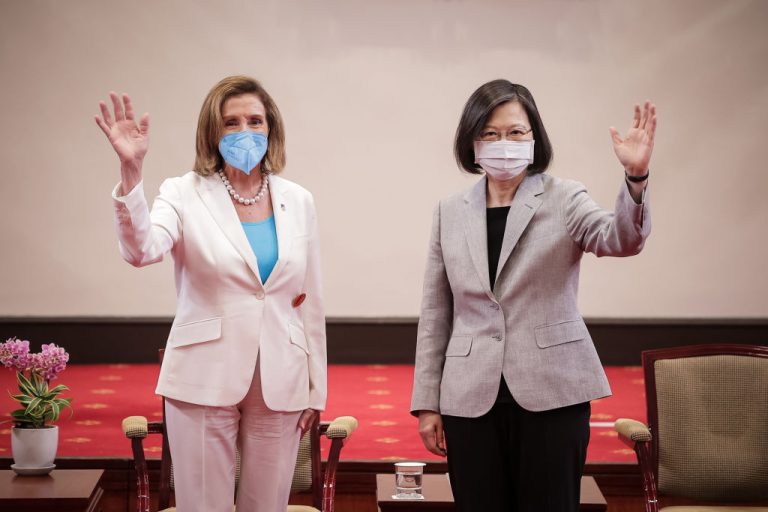China’s foreign ministry announced on Friday, Aug. 5 that it would be halting major talks with Washington on climate issues, in addition to suspending all future calls and meetings over Nancy Pelosi’s visit to Taiwan — further souring diplomatic relations between the world’s two major powers.
Hours after announcing sanctions on the U.S. House Speaker and her immediate family, the Chinese People’s Liberation Army (PLA) was seen increasing its military drills and exercises off the Taiwan strait — which included the firing of missiles that splashed into surrounding waters — vast amounts of which are disputed.
MORE ON SIMMERING CHINA-TAIWAN TENSIONS:
- Pelosi Arrives in Taiwan, Publishes Op-Ed Advocating Support for Island
- Pelosi Begins Asia Trip Amid Reports She Could Visit Taiwan
- Shooting at California Church Likely ‘Politically Motivated’ by China-Taiwan Dispute
- Now Banned in Hong Kong, Vigil Honoring Victims of Tiananmen to Be Moved to Taiwan
Pelosi’s trip to Taiwan marked the highest-level diplomatic contact between Washington and Taiwan in 25 years. The House Speaker met with Taiwanese leader Tsai Ing-wen and other high-ranking officials on Aug. 3 — further irking Beijing in the process.
The mainland Chinese regime claims Taiwan as a rightful part of its territory, and has vowed to reclaim the self-ruling island by any means necessary, even if that means using military force.
Beijing: Pelosi’s Taiwan visit is ‘vicious and provocative’
After Pelosi arrived in Taiwan on Aug. 2, Beijing warned that the visit was “vicious and provocative,” and would result in the serious “interfering of China’s internal affairs.”
Success
You are now signed up for our newsletter
Success
Check your email to complete sign up
“U.S. House Speaker Nancy Pelosi insisted on visiting Taiwan in disregard of China’s serious concerns and firm opposition, seriously interfering in China’s internal affairs, seriously undermining China’s sovereignty and territorial integrity, seriously trampling on the one-China principle, and seriously threatening the peace and stability across Taiwan Strait,” a statement from China’s Ministry of Foreign Affairs said.
Furthermore, People’s Republic of China (PRC) ambassador to the White House, Qin Gang, said on Aug. 4 that all major lines of communication between the two countries would be severed, adding that the annual naval meetings held under the China-US military maritime consultation mechanism would be canceled as well.
The White House responded late Aug. 4 by relaying a message via spokesman John Kirby that China’s increased military actions in the Taiwan strait were of “concern to Taiwan, to us, and to our partners around the world.”
PRC Foreign Ministry spokeswoman Hua Chunying also said in a daily press briefing that her country would be suspending cooperation on the repatriation of illegal immigrants, legal assistance on criminal matters, as well as the combat of transnational crimes.
Long standing dispute
Taiwan, officially known as the Republic of China (ROC), once governed all of China before being forced off the mainland by communist rebels, who founded the People’s Republic in 1949. The Chinese Communist Party (CCP) does not recognize either the ROC or an independent Taiwan, insisting that any country wishing to pursue diplomatic relations with it must first break official ties with Taipei under its One-China principle.
This law, in addition to Taiwan’s expulsion from the United Nations in 1979, has resulted in the island being isolated from the global community.
Since Beijing views Taiwan as a renegade province and rightful part of its territory, it has used violent rhetoric and threats in vowing to reclaim the self-ruling island by any means necessary — even going as far as threatening to use military action in achieving this reunification.
Though the U.S. is committed to its commitment with the One-China policy, U.S. Secretary of Defense Austin Lloyd said in June that the PLA’s increased hostility has become “more aggressive, unsafe, and unprofessional in the region.”
Adding to already simmering tensions between Washington and Beijing, Pelosi published an op-ed in the Washington Post on the day she arrived in Taiwan. Published on Aug. 2, the House Speaker explained the reasons behind her visit and why she was “leading a Congressional delegation to Taiwan.”
In the article, the Democrat congresswoman also stressed the obligations laid out in the 1979 Taiwan Relations Act (TRA), which require the U.S. government to provide military training and other necessary aid in helping Taiwan defend itself against a possible communist invasion.














